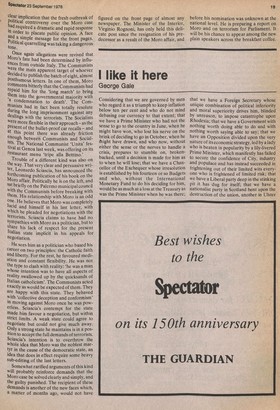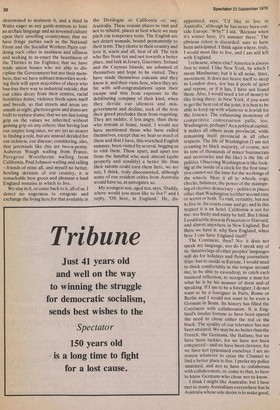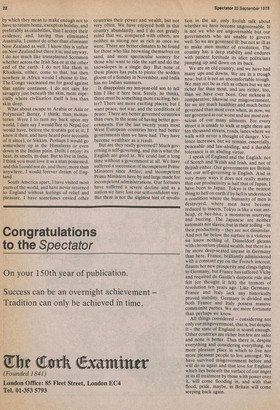I like it here
George Gale
Considering that we are governed by men who regard it as a triumph to keep inflation below ten per cent and who do not mind debasing our currency to that extent; that we have a Prime Minister who had not the sense to go to the country in June, when he might have won, who lost his nerve on the brink of deciding to go in October, when he Might have drawn, and who now, without either the sense or the nerves to handle a crisis, prepares to stumble on, brokenbacked, until a decision is made for him as to when he will lose; that we have a Chancellor of the Exchequer whose irresolution is established by his fourteen or so Budgets and who, without the International Monetary Fund to do his deciding for him, would be as much at a loss at the Treasury as was the Prime Minister when he was there; that we have a Foreign Secretary whose unique combination of political inferiority and moral superiority drives him, blinded by unreason, to impose catastrophe upon Rhodesia; that we have a Government with nothing worth doing able to do and with nothing worth saying able to say; that we have an Opposition divided upon the very nature of its economic strategy, led by a lady who is beaten in popularity by a lily-livered Prime Minister, which manifestly has failed to secure the confidence of City, industry and populace and has instead succeeded in frightening out of their limited wits everyone who is frightened of limited risk; that we have a Liberal party deep in the stinking pit it has dug for itself; that we have a nationalist party in Scotland bent upon the destruction of the union, another in Ulster deterrnined to maintain it, and a third in Wales eager as any guide-mistress to foist an archaic language and an invented culture upon their unwilling countrymen; that we have hinge parties such as the National Front and the Socialist Workers Party outdoing each other in nastiness and silliness and seeking to re-enact the beastliness of the Thirties in the Eighties; that we have trade union bosses who are able to discipline the Government but not their members; that we have militant minorities working their will upon majorities of sheep who baa-baa their way to industrial suicide; that our cities decay from their centres, racial hostilities fester, violence feeds upon itself and breeds, so that streets and areas are unsafe at night, ghettoes grow and slums are built to replace slums; that we are fast losing grip on the values we inherited without gaining grip on any others; that having lost our empire long since, we are yet no nearer to finding a role, but are instead derided for our sickness, our disease; considering, also, that jeremiads like this are two-a-penny, Auberon Waugh wailing from France, Peregrine Worsthorne wailing from California, Paul Johnson wailing and railing — friends of mine all, and myself no better, howling derision of our country, it is remarkable, bow green and pleasant a land England remains in which to live.
We stay in it, or come back to it, all of us. I detect no eagerness to emigrate and exchange the living here for that available in the Dordogne or California or, say, Australia. These remain places to visit and not to inhabit, places at best where we may pitch our temporary tents. The English are not desert nomads, bound permanently to their tents. They cleave to their country and love it, warts and all, best of all. The rich who flee from tax and not towards a better place, and lurk in Jersey, Guernsey, Ireland and the Cayman Islands, are ashamed of themselves and hope to be visited. They have made themselves outcasts and they know it, and their visits here, when they are fat with self-congratulations upon their escape and thin from exposure to the debilitating company of their kind, when they deride our idleness and misgovernment and decline, reek of the love their greed precludes them from requiting. They are sadder, if less angry, than those who remain at home, taxed. I would not have mentioned those who have exiled themselves, except that we hear so much of them and that I have, this wretched English summer, been visited by several, begging us to visit them. Those apart, and apart too from the handful who seek abroad (quite properly and sensibly) a better life than their talents could earn them here, we are not, I think, truly discontented, although some of our resident critics from Australia would have us, as surrogates so.
My youngest son, aged ten, says, 'Daddy, where would you most like to live?' and I reply, 'Oh here, in England.' He, dis appointed, says, `I'd like to live in Australia,' although he has never been outside Europe. 'Why?' I ask. 'Because when it's winter here, it's summer there.' The obvious retort is discarded: sure to have been anticipated. I think again where, truly, I would most like to live, and I am still left with England.
I rehearse, where else? America is always first to mind. I like New York, by which I mean Manhattan; but it is all noise, litter, movement. It does not heave itself to sleep as London does, nor has it pools of quiet and repose, or if it has, I have not found them. Also, I would need a lot of money to like living there: in New York, if you want to get the best out of the joint, it is best to be able to keep up with whatever is Jewish for the Joneses. The exhausting monotony of competitive conversation palls, too. Washington, perhaps? As a political capital, it makes all others seem provincial, while remaining itself provincial in all other respects. The life of Washington (I am not counting its black majority, of course, nor its tens of thousands of minor bureaucrats and secretaries and the like) is the life of politics. Observing Washington is like looking at the inside of a clock for the first time: you cannot see the time for the workings of the wheels. Here it all is: wheels, cogs, checks, balances, the power of the mainspring of elective democracy — politics in places other than Washington is either second-rate or secret or both. To visit, certainly, but not to live in. Its courts come and go; and in this respect it is an hotel. California is not for me: too fruity and nutty by half. But I think I could settle down in Princeton or Harvard, and almost anywhere in New England. But there we have it: why New England, when here I can have England itself?
The Continent, then? No: it does not speak my language, nor do I speak any of its. Smatterings of other peoples' languages will do for holidays and flying journalistic trips: but to reside in Europe, I would need to think comfortably in the tongue around me, to be able to eavesdrop, to catch each nuanced inflection, to recognise a man for what he is by his manner of dress and of speaking. If! am to be a foreigner, I do not want to be a foreigner in Paris, Rome or Berlin and I would not want to be even a German in Bonn. Its history has filled the Continent with collaborators. It is England's insular fortune to have been spared the need to chose either the red or the black. The quality of our tolerance has not been strained. We may be no better than the French, the Germans, the Italians; but we have been luckier, for we have not been conquered — and we have been cleverer, for we have not tyrannised ourselves. I see no reason whatever to cross the Channel to find a better place to live. I prefer my police unarmed, and not to have to collaborate with collaborators, or, come to that, to have to know Germans who chose not to know.
I think I might like Australia: but I have met so many Australians everywhere but in Australia whose sole desire is to make good, by which they mean to make enough not to have to return home, except on holiday, and preferably as celebrities, that I accept their evidence; and, having thus eliminated Australia, I cannot do other than eliminate New Zealand as well. I know this is unfair on New Zealand but there it is; and anyway, I do not much like transplanted Scotsmen whether across the Irish Sea or at the other end of the earth. I do not like them in Rhodesia, either, come to that, but then nowhere in Africa would I choose to live. The Congo vaccinated me for good against that entire continent. I do not care for savagery just beneath the skin, more especially where civilisation itself is less than skin deep.
What about escape to Arabia or Asia or Polynesia? Better, I think, than monasteries. Were I to turn my back upon my world, I dare say I would flee to Nepal (or would have, before the tourists got at it; I knew it then, and have heard poor accounts of it since), or Sikkim. Perhaps I would go somewhere up in the Himalayas or even down in the Indian plain. Delhi I enjoy: its heat, its smells, its dust. But to live in India, I think you must love it as a man possessed, and this I could not do, and there, more than anywhere, I would forever dream of England.
South America apart, I have visited most. parts of the world, and have never returned to England without feelings of relief and pleasure. I have sometimes envied other countries their power and wealth, but not very often. We have enjoyed both in this country abundantly, and I do not greatly mind that we, compared with others, are neither as strong nor as rich as once we were. There are better climates to be found for those who like browning themselves on sand, and more spectacular scenery for those who want to ride the surf and ski the snowslopes in a single day. But none of these places has pubs to pierce the sodden gloom of a Sunday in November, and India has no Indian summers.
It disappoints my ten-year-old son to tell him I like it here best, Surely, he thinks, there must be something more exciting, better? There are more exciting places; but I want peace, not war, and the conditions of peace. There are better governed countries than ours, in the sense of having better governments. For the last twenty years most West European countries have had better governments than we have had: They have become wealthier as a result.
But are they really governed? Much governing is self-governing, and this is what the English are good at. We could last a long time without a government at all. We have suffered a succession of incompetent Prime Ministers since Attlee; and incompetent Prime Ministers have by and large made for incompetent administrations. Our fortunes have suffered a severe decline and as a nation we have lost our self-confident way. But there is not the slightest hint of revolu tion in the air, only foolish talk about whether we have become ungovernable. It is not we who are ungovernable but our governments who are unable to govern well. So we are governed ill: but not so ill as to make men mutter of revolution. The country has a deep stability and endures with patient fortitude its idiot politicians jumping up and down on its back.
We are an old country, and we have had many ups and downs. We are in a trough now: but it is not an uncomfortable trough. We may not be as rich as others but we are richer far than most, and are richer, too, than we have ever been. Our sickness is comparative; likewise our misgovernment, for we are much healthier and much better governed than most even when, as now, we are governed at our worst and are most conscious of our many ailments. For every street it is unsafe to walk at night there are ten thousand streets, roads, lanes where we walk with never a thought of danger. Violence increases, but we remain, essentially, peaceable and law-abiding, and a durable tolerance is an abiding virtue.
I speak of England and the English: not of Scotch and Welsh and Irish, and not of British either. Our governments are British but our self-governing is English. And in very many ways it does not really matter that our productivity is half that of Japan. I have been to Japan. Tokyo is the nearest thing to hell on earth if by hell is understood a condition where the humanity of men is destroyed, where men have become reduced to insects. Tokyo is like a vast antheap, or bee-hive, a monstrous scurrying and buzzing. The Japanese are neither automats nor slaves; but in their toiling — in their productivity — they are not dissimilar. And not far below the surface is a violence we know nothing of. Dusseldorf gleams with chromium-plated wealth, but there is a far more deep-seated unease in Germany than here. France, brilliantly administered with a constant eye on the French interest, flaunts her new prosperity and clings tightly to Germany, but France has suffered Vichy and required de Gaulle's despotic rule and felt (or thought it felt) the tremors of revolution ten years ago. Like Germany, France and Italy lack any historically proved stability, Germany is divided and both France and Italy possess massive communist parties. We are more fortunate than perhaps we know.
All things considered — considering not only our misgovernment, that is, but despite it — the state of England is sound enough. Other countries are richer but few are safer and none is better. Thus there is, despite everything and considering everything, no more pleasant place in which to live nor more pleasant people to live amongst. We have survived misgovernment before and will do so again and that love for England which lies beneath the surface of our anger at its ill treatment by those with power over it, will come flooding in, and with that flood, pride, maybe, in Britain will come seeping back again.




































































































 Previous page
Previous page